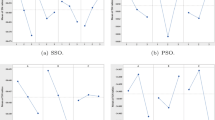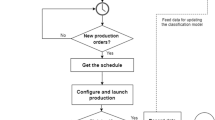Abstract
The concept of parallel machines has been widely used in manufacturing. This article proposes a genetic algorithm (GA) approach to minimize total tardiness of a set of tasks for identical parallel machines and worker assignment to machines. A spreadsheet-based GA approach is presented to solve the problem. A domain-independent general purpose GA is used, which is an add-in to the spreadsheet software. The paper demonstrates an adaptation of the proprietary GA software to the problem of minimizing total tardiness for the worker assignment scheduling problem for identical parallel machine models. Two 100 I/P/n/m/W problems taken from Hu (Int J Adv Manuf Technol 23:383–388, 2004, Int J Adv Manuf Technol 29:165–169, 2006) for a similar study are simulated. The performance of GA is superior to SES-A/LMC approach used by Hu and very close to the Exhaustive search procedure. It is shown that the spreadsheet GA implementation makes it very easy to adapt the problem for any set of objective measures without changing the actual model. Empirical analysis has been carried out to study the effect of GA parameters, namely, crossover rate, mutation rate, and the population size.
Similar content being viewed by others
References
Akyol DE, Bayhan GM (2007) Multi-machine earliness and tardiness scheduling problem: an interconnected neural network approach. Int J Adv Manuf Technol doi:10.1007/s00170-007-0993-0
Amirthagadeswaran KS, Arunachalam VP (2007) Enhancement of performance of Genetic Algorithm for job shop scheduling problems through inversion operator. Int J Adv Manuf Technol 32(7–8):780–786 doi:10.1007/s00170-005-0392-3
Azizoglu M, Kirca O (1998) Tardiness minimization on parallel machines. Int J Prod Econ 55(2):163–168 doi:10.1016/S0925-5273(98)00034-6
Baptiste P (2000) Scheduling equal-length jobs on identical parallel machines. Discrete Appl Math 103(1–3):21–32 doi:10.1016/S0166-218X(99)00238-3
Chaudhry IA, Drake PR (2007) Minimizing flow time variance in a single machine system using genetic algorithms. Int J Adv Manuf Technoldoi:10.1007/s00170-007-1221-7
Cheng R, Gen M, Tozawa T (1995) Maximum earliness/tardiness scheduling in identical parallel machine system using genetic algorithms. Comput Ind Eng 29(1–4):513–517 doi:10.1016/0360-8352(95)00126-L
Cheng TCE, Sin CCS (1990) A state-of-the art review of parallel machine scheduling research. Eur J Oper Res 47:271–292 doi:10.1016/0377-2217(90)90215-W
Chen Y-W, Lu Y-Z, Yang G-K (2008) Hybrid evolutionary algorithm with marriage of genetic algorithm and extremal optimization for production scheduling. Int J Adv Manuf Technol 36(9–10):959–968 doi:10.1007/s00170-006-0904-9
Chen Z-L, Lee C-Y (2002) Parallel machine scheduling with a common due window. Eur J Oper Res 136(3):512–527 doi:10.1016/S0377-2217(01)00068-6
Chen Z-L, Powell WB (1999) A column generation based decomposition algorithm for a parallel machine just-in-time scheduling problem. Eur J Oper Res 116(1):220–232 doi:10.1016/S0377-2217(98)00136-2
Chen L, Powell WB (2000) Scheduling multiple families of jobs on parallel machines to minimize total weighted completion time. IEEE Real Time Technology and Applications Symposium
Choi B-C, Yoon S-H (2007) Maximizing the weighted number of just-in-time jobs in flow shop scheduling. J Sched 10:237–243 doi:10.1007/s10951-007-0030-z
Choi S-W, Kim Y-D (2007) Minimizing makespan on a two-machine re-entrant flowshop. J Oper Res Soc 58:972–981 doi:10.1057/palgrave.jors.2602220
Chou F-D, Chang P-C, Wang H-M (2006) A hybrid genetic algorithm to minimize makespan for the single batch machine dynamic scheduling problem. Int J Adv Manuf Technol 31(3–4):350–359 doi:10.1007/s00170-005-0194-7
Davis L (1985) Job Shop Scheduling with Genetic Algorithms. In: Proceedings of the 1st International Conference on Genetic Algorithms, Lawrence Erlbaum
Davis L (1991) Handbook of genetic algorithms. Van Nostrand Reinhold, New York
Dogramaci A, Surkis J (1979) Evaluation of a heuristic for scheduling independent jobs on parallel identical processors. Manage Sci 25(12):1208–1216
Evolver User’s Guide (1994) Axcelis, Inc., Seattle, WA, USA
Goldberg DE (1989) Genetic algorithms in search, optimization and machine learning. Addison-Wesley, Boston, MA
Guo ZX, Wong WK, Leung SYS, Fan JT, Chan SF (2008) A genetic-algorithm-based optimization model for scheduling flexible assembly lines. Int J Adv Manuf Technol 36(1–2):156–168 doi:10.1007/s00170-006-0818-6
Gupta MC, Gupta YP, Kumar A (1993) Minimizing the flow time variance in a single machine system using genetic algorithms. Eur J Oper Res 70:289–303 doi:10.1016/0377-2217(93)90240-N
Haida T, Akimoto Y (1991) Genetic algorithms approach to voltage optimization, Proceedings of the IEEE First International Forum on the Applications of Neural Networks to Power Systems, 139–143
Haq AN, Balasubramanian K, Sashidharan B, Karthick RB (2008) Parallel line job shop scheduling using genetic algorithm. Int J Adv Manuf Technol 35(9–10):1047–1052 doi:10.1007/s00170-007-1164-z
Ho JC, Chang YL (1995) Minimizing the number of tardy jobs for m parallel machines. Eur J Oper Res 84:343–355 doi:10.1016/0377-2217(93)E0280-B
Ho JC, Wong JS (1995) Makespan minimization for m parallel identical processors. Nav Res Logist 42:935–948 doi:10.1002/1520-6750(199509)42:<935::AID-NAV3220420606>3.0.CO;2-D
Hu P-C (2004) Minimising total tardiness for the worker assignment scheduling problem in identical parallel-machine models. Int J Adv Manuf Technol 23:383–388 doi:10.1007/s00170-003-1716-9
Hu P-C (2006) Further study of minimizing total tardiness for the worker assignment scheduling problem in the identical parallel-machine models. Int J Adv Manuf Technol 29:165–169 doi:10.1007/s00170-004-2487-7
Jeong SJ, Kim KS (2007) Parallel machine scheduling with earliness-tardiness penalties and space limits. Int J Adv Manuf Technol. doi:10.1007/s00170-007-1027-7
Kang Y-H, Kim S-S, Shin H-J (2007) A scheduling algorithm for the reentrant shop: an application in semiconductor manufacture. Int J Adv Manuf Technol 35:566–574 doi:10.1007/s00170-006-0736-7
Kim K, Jeong I-J (2007) Flow shop scheduling with no-wait flexible lot streaming using an adaptive genetic algorithm. Int J Adv Manuf Technol doi:10.1007/s00170-007-1236-0
Lee YH, Pinedo M (1997) Scheduling jobs on parallel machines with sequence-dependent setup times. Eur J Oper Res 100:464–474 doi:10.1016/S0377-2217(95)00376-2
Li C-L, Cheng TCE (1993) The parallel machine min-max weighted absolute lateness scheduling problem. Nav Res Logist 41:33–46 doi:10.1002/1520-6750(199402)41:1<33::AID-NAV3220410104>3.0.CO;2-S
Liu L, Gu H-Y, Xi Y-G (2007) Robust and stable scheduling of a single machine with random machine breakdowns. Int J Adv Manuf Technol 31(7–8):645–654 doi:10.1007/s00170-005-0237-0
Min L, Cheng W (2006) Genetic algorithms for the optimal common due date assignment and the optimal scheduling policy in parallel machine earliness/tardiness scheduling problems. Robot Comput-Integr Manuf 22(4):279–287 doi:10.1016/j.rcim.2004.12.005
Omar MK, Teo SC (2006) Minimizing the sum of earliness/tardiness in identical parallel machines schedule with incompatible job families: an improved MIP approach. Appl Math Comput 181(2):1008–1017 doi:10.1016/j.amc.2006.01.068
Park Y, Kim S, Lee Y-H (2000) Scheduling jobs on parallel machines applying neural network and heuristic rules. Comput Ind Eng 38(1):189–202 doi:10.1016/S0360-8352(00)00038-3
Prasad SD, Krishnaiah Chetty OV (2006) A genetic algorithmic approach to multi-objective scheduling in a Kanban-controlled flowshop with intermediate buffer and transport constraints. Int J Adv Manuf Technol 29(5):564–576 doi:10.1007/s00170-005-2517-0
Reddy BSP, Rao CSP (2006) A hybrid multi-objective GA for simultaneous scheduling of machines and AGVs in FMS. Int J Adv Manuf Technol 31(5–6):602–613 doi:10.1007/s00170-005-0223-6
Ruiz R, Allahverdi A (2007) No-wait flowshop with separate setup times to minimize maximum lateness. Int J Adv Manuf Technol 35(5–6):551–565 doi:10.1007/s00170-006-0726-9
Scharbrodt M, Steger A, Weisser H (1999) Approximability of scheduling with fixed jobs. Proceedings of the 10th Annual ACM-SIAM Symposium on Discrete Algorithms S961–S962
Serifoglu FS, Ulusoy G (1999) Parallel machine scheduling with earliness and tardiness penalties. Comput Oper Res 26(8):773–787 doi:10.1016/S0305-0548(98)00090-2
Shim S-O, Kim Y-D (2007) Scheduling on parallel identical machines to minimize total tardiness. Eur J Oper Res 177(1):135–146 doi:10.1016/j.ejor.2005.09.038
Shim S-O, Kim Y-D (2008) A branch and bound algorithm for an identical parallel machine scheduling problem with a job splitting property. Comput Oper Res 35(3):863–875 doi:10.1016/j.cor.2006.04.006
Sun H, Wang G (2003) Parallel machine earliness and tardiness scheduling with proportional weights. Comput Oper Res 30(5):801–808 doi:10.1016/S0305-0548(02)00055-2
Vinod V, Sridharan R (2007) Dynamic job-shop scheduling with sequence-dependent setup times: simulation modeling and analysis. Int J Adv Manuf Technol 36:355–372 doi:10.1007/s00170-006-0836-4
Webster S, Azizoglu M (2001) Dynamic programming algorithms for scheduling parallel machines with family setup times. Comput Oper Res 28(2):127–137 doi:10.1016/S0305-0548(99)00094-5
Whitley D (1988) GENITOR: a different genetic algorithm. In: Proceedings of the Rocky Mountain Conference on Artificial Intelligence. Denver, Colorado
Xu X-D, Li C-X (2007) Research on immune genetic algorithm for solving the job-shop scheduling problem. Int J Adv Manuf Technol 34(7–8):783–789 doi:10.1007/s00170-006-0652-x
Yalaoui F, Chu C (2002) Parallel machine scheduling to minimize total tardiness. Int J Prod Econ 76(3):265–279 doi:10.1016/S0925-5273(01)00175-X
Author information
Authors and Affiliations
Corresponding author
Rights and permissions
About this article
Cite this article
Chaudhry, I.A., Drake, P.R. Minimizing total tardiness for the machine scheduling and worker assignment problems in identical parallel machines using genetic algorithms. Int J Adv Manuf Technol 42, 581–594 (2009). https://doi.org/10.1007/s00170-008-1617-z
Received:
Accepted:
Published:
Issue Date:
DOI: https://doi.org/10.1007/s00170-008-1617-z




